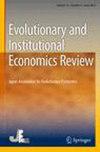另类货币政策规则与预期一致性
IF 0.6
Q4 ECONOMICS
Evolutionary and Institutional Economics Review
Pub Date : 2021-03-27
DOI:10.1007/s40844-021-00208-2
引用次数: 1
摘要
我们建立了一个宏观经济模型,允许非线性的利率规则。我们假设在确定利率时,货币当局考虑了实际通货膨胀与产能利用率之间的相互作用,因此利率规则对通货膨胀缺口的敏感性随经济周期的变化而变化。我们提出的宏观经济政策框架使货币当局能够对通货膨胀和产品给予同样的重视,而不会忽视通货膨胀目标对封闭经济和开放经济的预期锚定作用。本文章由计算机程序翻译,如有差异,请以英文原文为准。
Alternative monetary policy rules and expectational consistency
We build a macroeconomic model that allows for non-linearity in the interest rate rule. We assume that to determine the rate of interest, the monetary authority considers the interaction between the actual inflation and the capacity utilization, so that the sensitivity of the interest rule to the inflation gap varies in accordance with the business cycle. The macroeconomic policy framework we propose enables the monetary authority to give as much weight to inflation as to the product without losing sight of the expected anchor role of the inflation target, for a closed economy as well as for an open economy.
求助全文
通过发布文献求助,成功后即可免费获取论文全文。
去求助
来源期刊
自引率
0.00%
发文量
15
期刊介绍:
The Evolutionary and Institutional Economics Review (EIER) is issued by the Japan Association for Evolutionary Economics to provide an international forum for new theoretical and empirical approaches to evolutionary and institutional economics. EIER, free from the view of equilibrium economics and methodological individualism, should face the diversity of human behavior and dynamic transformation of institutions. In EIER, “economics” is used in its broadest sense. It covers areas from the classic research in economic history, economic thought, economic theory, and management science to emerging research fields such as economic sociology, bio-economics, evolutionary game theory, agent-based modeling, complex systems study, econo-physics, experimental economics, and so on. EIER follows the belief that a truly interdisciplinary discussion is needed to propel the investigation in the dynamic process of socio-economic change where institutions as emergent outcomes of human actions do matter. Although EIER is an official journal of the Japan Association for Evolutionary Economics, it welcomes non-members'' contributions from all parts of the world. All the contributions are refereed under strict scientific criteria, although EIER does not apply monolithic formalistic measure to them. Evolution goes hand in hand with diversities; this is also the spirit of EIER. Focus areas of the Review (not exhaustive): - Foundations of institutional and evolutionary economics - Criticism of mainstream views in the social sciences - Knowledge and learning in socio-economic life - Development and innovation of technologies - Transformation of industrial organizations and economic systems - Experimental studies in economics - Agent-based modeling of socio-economic systems - Evolution of the governance structure of firms and other organizations - Comparison of dynamically changing institutions of the world - Policy proposals in the transformational process of economic life

 求助内容:
求助内容: 应助结果提醒方式:
应助结果提醒方式:


